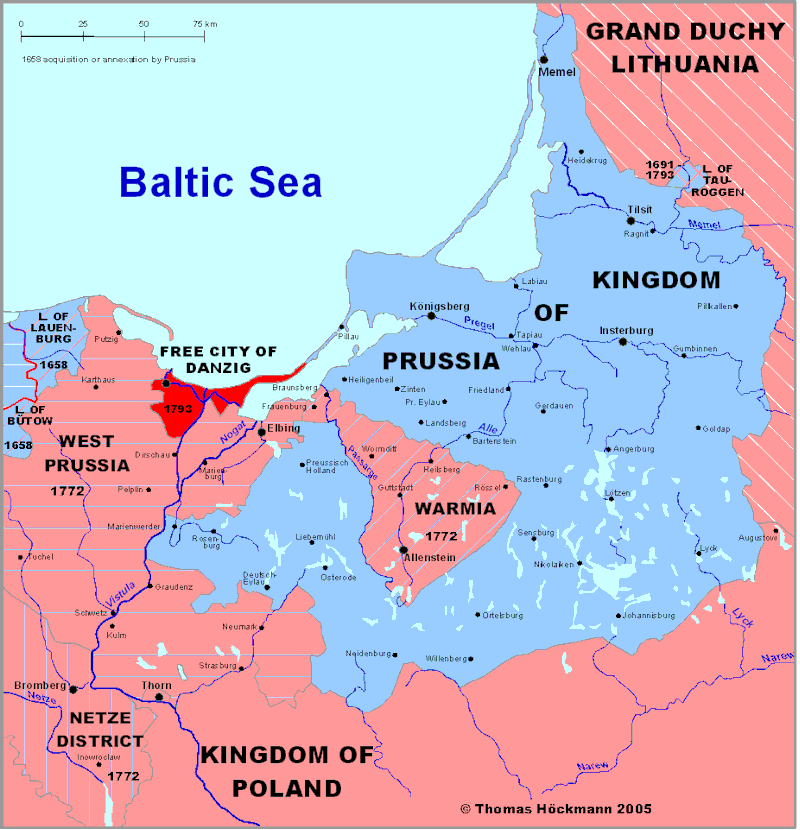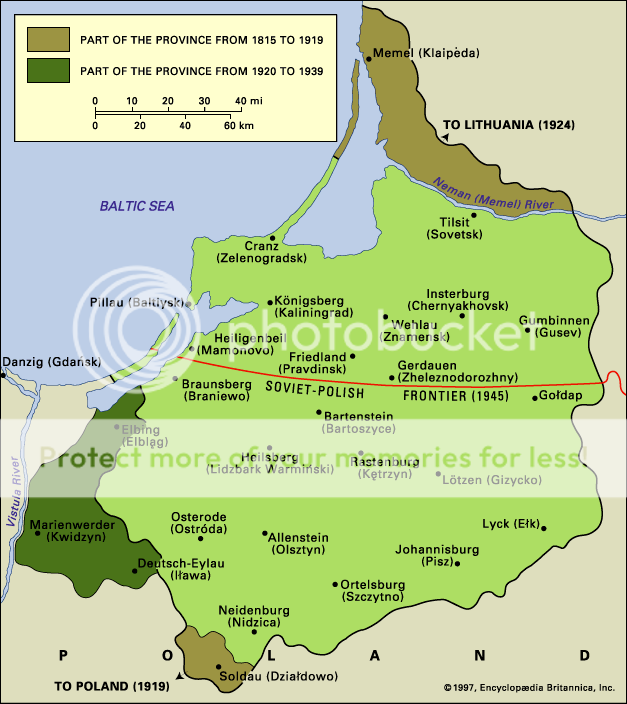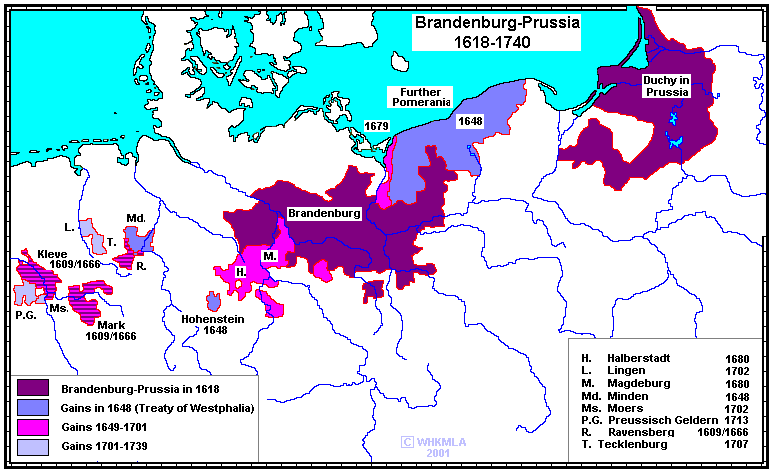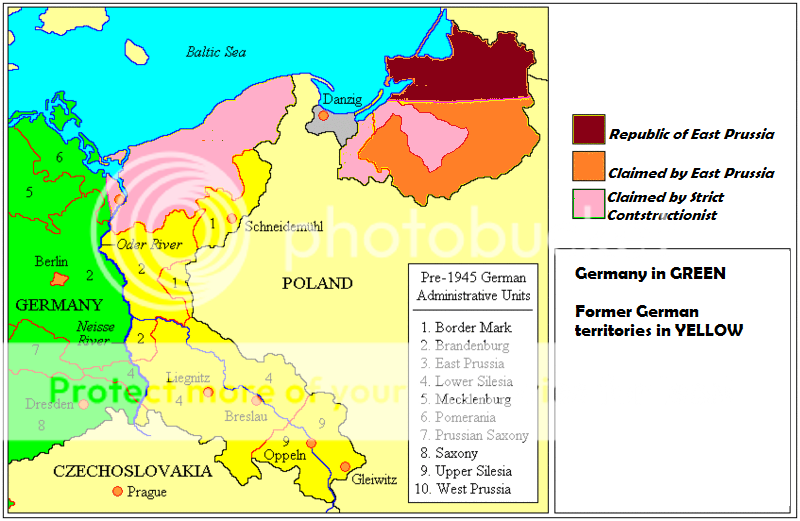Your challenge, would you choose to accept it, is to make East Prussia an independent state that survives until now, with a POD no earlier than the October Revolution in Russia in 1917. East Prussia could possibly be invaded and occupied in a world war or under other arrangements, but it must eventually become an independent state again, with almost the same borders as in the interwar period in OTL. The independent state of East Prussia could be born any time before 1960, but agter that, it must not be merged into Germany, Poland and Russia. Any takers?
You are using an out of date browser. It may not display this or other websites correctly.
You should upgrade or use an alternative browser.
You should upgrade or use an alternative browser.
AHC: Independent East Prussia
- Thread starter Tony
- Start date
I don't know much about European History.
Only thing come to my head is:
SU will get part of Poland after WW II like OTL. Not move Germans from East Prussia. Give East Prussia to Poland as compensation. Make Poland like OTL Czechoslovakia. After 1990, East Prussia and Poland separates like Czechoslovakia.
Only thing come to my head is:
SU will get part of Poland after WW II like OTL. Not move Germans from East Prussia. Give East Prussia to Poland as compensation. Make Poland like OTL Czechoslovakia. After 1990, East Prussia and Poland separates like Czechoslovakia.
Your challenge, would you choose to accept it, is to make East Prussia an independent state that survives until now, with a POD no earlier than the October Revolution in Russia in 1917. East Prussia could possibly be invaded and occupied in a world war or under other arrangements, but it must eventually become an independent state again, with almost the same borders as in the interwar period in OTL. The independent state of East Prussia could be born any time before 1960, but agter that, it must not be merged into Germany, Poland and Russia. Any takers?
Have East Prussia become its own SSR following WWII, instead of being merged into Poland and the RSFSR as OTL. Then have it become independent when the USSR collapses.
Alternatively, have a Communist revolution in Germany after WWI, with most of Germany becoming Communist but the government fleeing to East Prussia and setting up a rump non-Communist Germany there.
Hmm... This is something which I have considered before:
Operation Valkyrie is a success. Germany makes peace with the western allies (probably requires an earlier POD which makes Roosevelt and Churchill less happy with Stalin). Stalin is initially less willing to make peace and continues the war. The Wehrmacht pulls back to the Vistula, armies in France, Italy and the Low Countries are rushed to the east.
The Red Army fights the Wehrmacht back to the Oder, while the WA fully occupy OTL Germany (maybe including some of Silesia) and Austria (maybe Czechia too?). The occupation zones are vastly skewed against the Soviets. Stalin, still wanting to have a German state, does not expel the Germans from Prussia. East Prussia becomes the Democratic Socialist Prussian Republic or something like that and a member of the Warsaw Pact. Cold War ensues, with an Iron Curtain falling on the Oder River - OTL Czech/Slovak border - OTL Austrian/Hungarian Border - OTL Austrian/Slovenian Border.
After the Cold War ends, Prussia does not desire to reunite with Germany, and vice-versa, due to cultural, economic, and geographic reasons. Prussia styles itself as the fourth Baltic state, rather than an east german one, and becomes a prosperous little country in its own right, having friendly relations with the other Baltic States and Poland.
Operation Valkyrie is a success. Germany makes peace with the western allies (probably requires an earlier POD which makes Roosevelt and Churchill less happy with Stalin). Stalin is initially less willing to make peace and continues the war. The Wehrmacht pulls back to the Vistula, armies in France, Italy and the Low Countries are rushed to the east.
The Red Army fights the Wehrmacht back to the Oder, while the WA fully occupy OTL Germany (maybe including some of Silesia) and Austria (maybe Czechia too?). The occupation zones are vastly skewed against the Soviets. Stalin, still wanting to have a German state, does not expel the Germans from Prussia. East Prussia becomes the Democratic Socialist Prussian Republic or something like that and a member of the Warsaw Pact. Cold War ensues, with an Iron Curtain falling on the Oder River - OTL Czech/Slovak border - OTL Austrian/Hungarian Border - OTL Austrian/Slovenian Border.
After the Cold War ends, Prussia does not desire to reunite with Germany, and vice-versa, due to cultural, economic, and geographic reasons. Prussia styles itself as the fourth Baltic state, rather than an east german one, and becomes a prosperous little country in its own right, having friendly relations with the other Baltic States and Poland.
I did this for an older post entitled "Alternative Territorial Disputes" here:
https://www.alternatehistory.com/di...4370&page=2&highlight=Prussia+microsoft+paint
But it also applies to your question, so I'll post it again:
After the fall of Germany in 1945, Soviet Premiere Joseph Stalin shocked his aides by advising that the Soviet Union would not expel Germans living in the soon to be annexed Kaliningrad enclave. History would debate why he suddenly changed his mind on the issue, although most historians believed he was fearful of a George Patton led Allied invasion of the Soviet Union. He knew that such an invasion, if it were to happen, would take place with thousands of Germans at the head of the army, and as a result he decided to keep at least a number of Germans inside the borders of the Soviet Union as quasi-hostages if hostilities between the United States and the Soviet Union erupted. This provision did not apply to Germans living in areas of Germany which were to be handed over to Poland, and as a result, the population of the Kaliningrad enclave swelled as German refugees flooded into the city of Konigsberg. Although most Germans elected to flee to Berlin or West Germany, Kaliningrad still saw a sudden surge in populatiom. For Stalin, this swell in population warranted the admission of the Republic of East Prussia into the Soviet Union as a full fledged Republic.
However, controversy soon arose when Joseph Stalin made a passing remark that the borders of the East Prussian SSR would reflect the "borders of East Prussia in 1700". Most assume he had either seen an inaccurate map (in which the Polish Province of Warmia was seen as encompassing all, as opposed to parts of, the southern portions of East Prussia) or had made the comment is passing and quickly changed his mind.

East Prussia in 1700, with the Polish Warmia Province
However, the language was not omitted from the final draft finalizing the borders of Poland and the Soviet Union at the Potsdam Conference. Historians believe that the Russian delegates were afraid of being seen as usurping Stalin, and the British delegates (under instructions from London) chose not to raise the apparent discrepancy. The American delegation, seeing the seeds of a possible conflict between Poland and the USSR, also chose to remain mute on the issue. However, the “1700 Provision” would ultimately have little effect on Polish-Soviet relations or prove problematic…at least at first. The 1700 Provision remained virtually ignored for the next 45 years, with “Stalin’s true intent” controlling, with the borders reflecting a former German East Prussia split almost in half, with the North making up the East Prussian SSR and the South being annexed to Poland (as in OTL).

Stalin's "True Intent". Actual border of Poland and USSR from 1945-1991
Unfortunatly upon the fall of the Soviet Union in 1991, problems began to emerge. With the independence of East Prussia in 1991, calls soon emerged from the East Prussians for large portions of the southern regions of the former province of East Prussia held by Poland, to the point that the two nations had a brief border war in 1992 (in which a Polish victory was scuttled when the German Republic threatened to intervene). The matter was further complicated by many East Prussians who wished to be unified with Germany. Also, several right wing parties in East Prussia emerged and made more extreme territorial demands of Poland. They demanded that the areas of Further Pomerania (which also, technically, made up part of Prussia in 1700) be turned over to the Republic of East Prussia. These groups claim much of northern Poland, and often adhere to a theory called “Strict Constructionism”, in which they claim that the Potsdam Conference is not open to interpretation and that the written terms must be adhered to without deviation.

Further Pomerania in 1700
Germany has indicated that it will not admit East Prussia into the Republic of Germany until all border disputes have been resolved, cooling passions with many East Prussians in regards to “the second reunification.” In a poll conducted in 2004, only 35% of East Prussians now favored reunification, down from 58% in 1992. Oddly enough, the East Prussians have made no claim on Danzig, in part due to clear language in the Potsdam Conference in regards to the status of Danzig as a Polish City, and in part due to the fact that Microsoft Paint won’t let me change the color of it.

Border dispute between Republic of East Prussia and Poland in 2012
https://www.alternatehistory.com/di...4370&page=2&highlight=Prussia+microsoft+paint
But it also applies to your question, so I'll post it again:
After the fall of Germany in 1945, Soviet Premiere Joseph Stalin shocked his aides by advising that the Soviet Union would not expel Germans living in the soon to be annexed Kaliningrad enclave. History would debate why he suddenly changed his mind on the issue, although most historians believed he was fearful of a George Patton led Allied invasion of the Soviet Union. He knew that such an invasion, if it were to happen, would take place with thousands of Germans at the head of the army, and as a result he decided to keep at least a number of Germans inside the borders of the Soviet Union as quasi-hostages if hostilities between the United States and the Soviet Union erupted. This provision did not apply to Germans living in areas of Germany which were to be handed over to Poland, and as a result, the population of the Kaliningrad enclave swelled as German refugees flooded into the city of Konigsberg. Although most Germans elected to flee to Berlin or West Germany, Kaliningrad still saw a sudden surge in populatiom. For Stalin, this swell in population warranted the admission of the Republic of East Prussia into the Soviet Union as a full fledged Republic.
However, controversy soon arose when Joseph Stalin made a passing remark that the borders of the East Prussian SSR would reflect the "borders of East Prussia in 1700". Most assume he had either seen an inaccurate map (in which the Polish Province of Warmia was seen as encompassing all, as opposed to parts of, the southern portions of East Prussia) or had made the comment is passing and quickly changed his mind.

East Prussia in 1700, with the Polish Warmia Province
However, the language was not omitted from the final draft finalizing the borders of Poland and the Soviet Union at the Potsdam Conference. Historians believe that the Russian delegates were afraid of being seen as usurping Stalin, and the British delegates (under instructions from London) chose not to raise the apparent discrepancy. The American delegation, seeing the seeds of a possible conflict between Poland and the USSR, also chose to remain mute on the issue. However, the “1700 Provision” would ultimately have little effect on Polish-Soviet relations or prove problematic…at least at first. The 1700 Provision remained virtually ignored for the next 45 years, with “Stalin’s true intent” controlling, with the borders reflecting a former German East Prussia split almost in half, with the North making up the East Prussian SSR and the South being annexed to Poland (as in OTL).

Stalin's "True Intent". Actual border of Poland and USSR from 1945-1991
Unfortunatly upon the fall of the Soviet Union in 1991, problems began to emerge. With the independence of East Prussia in 1991, calls soon emerged from the East Prussians for large portions of the southern regions of the former province of East Prussia held by Poland, to the point that the two nations had a brief border war in 1992 (in which a Polish victory was scuttled when the German Republic threatened to intervene). The matter was further complicated by many East Prussians who wished to be unified with Germany. Also, several right wing parties in East Prussia emerged and made more extreme territorial demands of Poland. They demanded that the areas of Further Pomerania (which also, technically, made up part of Prussia in 1700) be turned over to the Republic of East Prussia. These groups claim much of northern Poland, and often adhere to a theory called “Strict Constructionism”, in which they claim that the Potsdam Conference is not open to interpretation and that the written terms must be adhered to without deviation.

Further Pomerania in 1700
Germany has indicated that it will not admit East Prussia into the Republic of Germany until all border disputes have been resolved, cooling passions with many East Prussians in regards to “the second reunification.” In a poll conducted in 2004, only 35% of East Prussians now favored reunification, down from 58% in 1992. Oddly enough, the East Prussians have made no claim on Danzig, in part due to clear language in the Potsdam Conference in regards to the status of Danzig as a Polish City, and in part due to the fact that Microsoft Paint won’t let me change the color of it.

Border dispute between Republic of East Prussia and Poland in 2012
Will Kürlich Kerl
Banned
Have East Prussia become its own SSR following WWII, instead of being merged into Poland and the RSFSR as OTL. Then have it become independent when the USSR collapses.
Alternatively, have a Communist revolution in Germany after WWI, with most of Germany becoming Communist but the government fleeing to East Prussia and setting up a rump non-Communist Germany there.
Or the other way around. Have communists rise in East Prussia, just like they did in Bavaria, but have those communists in East Prussia succeed. Then, they can team up with the USSR later in the 1930s to partition Poland.
Or the other way around. Have communists rise in East Prussia, just like they did in Bavaria, but have those communists in East Prussia succeed. Then, they can team up with the USSR later in the 1930s to partition Poland.
I could see this working as well, although you have to wonder how the People's Republic of East Prussia would fare after 1939 if (and big if here) Hitler doesn't get butterflied away. In OTL Hitler received the bulk of his electoral support from East Prussia and if you have a Communist East Prussia it might serve to lessen the preceived threat on Germany that led to Hitler's rise in the first place.
Share: